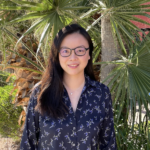Webinar presented by Jill Castek, Rachel Floyd, Emily Hellmich, Blaine Smith, Wen Wen & Austin Morris from the University of Arizona (see their individual bios below).
Multimodal projects use multiple modes to communicate ideas. In the digital world, images, sounds, colors and other design features together convey meaning that one mode alone cannot fully express. This webinar illustrates how composing across multiple modes (e.g., video, images, animation) can increase learners’ motivation, build digital literacies, and L2 expand communicative capacity. Classroom examples connect multimodality with socioscientific issues (controversial, real-world problems informed by science, e.g., global warming, genetic engineering) to encourage understanding of complex issues.
In this interactive webinar, participants will learn: 1) about multimodality; 2) how socioscientific issues can dovetail with multimodal projects; and 3) strategies for designing, implementing, and assessing multimodal projects in their own teaching contexts.
This event is part of the CERCLL project, Advancing L2 Composition through Socioscientific Issues.
To access resources related to this project and webinar, please visit this website created by the presenters here.
You can also access the padlet used by presenters during the webinar and view participants’ contributions here:
Section 1 Multimodality application & interaction slide (slide 15)
Section 2 Designing Instruction application & interaction slide (slide 37)
Section 3 Implementing Instruction (slide 50).
Section 4 Assessing Learning (slide 66)
Section 4 Assessing Learning (slide 67).
See presentation slides here (PDF).
Bios
 Jill Castek is an associate professor in the department of Teaching, Learning and Sociocultural Studies at the University of Arizona. Her research addresses the intersection of literacy and technology and examines the development of literate capacities, both in print and digital forms, in classrooms and beyond them. Her work explores how literacy and collaborating digitally can support language development, knowledge building, and STEM learning.
Jill Castek is an associate professor in the department of Teaching, Learning and Sociocultural Studies at the University of Arizona. Her research addresses the intersection of literacy and technology and examines the development of literate capacities, both in print and digital forms, in classrooms and beyond them. Her work explores how literacy and collaborating digitally can support language development, knowledge building, and STEM learning.
 Rachel Floyd is a graduate student in the Second Language Acquisition and Teaching interdisciplinary graduate program at the University of Arizona. She earned her Master’s in French and Bachelor of Arts in French and Psychology from the University of Tennessee. Her research interests include multiliteracies, technology-enhanced language learning, and professional learning of language instructors.
Rachel Floyd is a graduate student in the Second Language Acquisition and Teaching interdisciplinary graduate program at the University of Arizona. She earned her Master’s in French and Bachelor of Arts in French and Psychology from the University of Tennessee. Her research interests include multiliteracies, technology-enhanced language learning, and professional learning of language instructors.
 Emily Hellmich is an assistant professor of French & Second Language Acquisition/Teaching at the University of Arizona. Her work focuses on the impact of our global, digital world on language education. Her research has appeared in TeachersCollege Record, CALICO, Foreign Language Annals, and Computer Assisted Language Learning.
Emily Hellmich is an assistant professor of French & Second Language Acquisition/Teaching at the University of Arizona. Her work focuses on the impact of our global, digital world on language education. Her research has appeared in TeachersCollege Record, CALICO, Foreign Language Annals, and Computer Assisted Language Learning.
 Blaine Smith is an associate professor in the Department of Teaching, Learning and Sociocultural Studies at the University of Arizona. Her research focuses on the multimodal composing processes of culturally and linguistically diverse adolescents and teacher integration of technology. Her research has appeared in Reading Research Quarterly, Research in the Teaching of English, Written Communication, Journal of Second Language Writing, and Computers & Education.
Blaine Smith is an associate professor in the Department of Teaching, Learning and Sociocultural Studies at the University of Arizona. Her research focuses on the multimodal composing processes of culturally and linguistically diverse adolescents and teacher integration of technology. Her research has appeared in Reading Research Quarterly, Research in the Teaching of English, Written Communication, Journal of Second Language Writing, and Computers & Education.
 Wen Wen is a graduate student in the Department of Teaching, Learning, and Sociocultural Studies at the University of Arizona. Wen Wen obtained her M.A from the University of Arizona majoring in Language, Reading, and Culture. Wen is a doctoral student focusing on digital literacies, multimodality, and technology-enhanced teaching and learning.
Wen Wen is a graduate student in the Department of Teaching, Learning, and Sociocultural Studies at the University of Arizona. Wen Wen obtained her M.A from the University of Arizona majoring in Language, Reading, and Culture. Wen is a doctoral student focusing on digital literacies, multimodality, and technology-enhanced teaching and learning.

